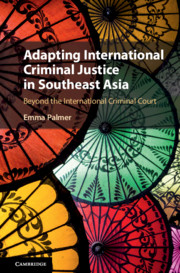Book contents
- Adapting International Criminal Justice in Southeast Asia
- Adapting International Criminal Justice in Southeast Asia
- Copyright page
- Dedication
- Contents
- Tables
- Acknowledgements
- Cases, Laws, and Treaties
- Abbreviations
- 1 Localising International Criminal Justice in Southeast Asia
- 2 Engaging with International Criminal Law alongside an Internationalised Tribunal
- 3 Implementing International Criminal Justice
- 4 Engaging with International Criminal Law as a Non-State Party
- 5 International Criminal Justice in ‘Transition’
- 6 Adapting International Criminal Justice in Southeast Asia
- Book part
- References
- Index
4 - Engaging with International Criminal Law as a Non-State Party
Indonesia
Published online by Cambridge University Press: 28 April 2020
- Adapting International Criminal Justice in Southeast Asia
- Adapting International Criminal Justice in Southeast Asia
- Copyright page
- Dedication
- Contents
- Tables
- Acknowledgements
- Cases, Laws, and Treaties
- Abbreviations
- 1 Localising International Criminal Justice in Southeast Asia
- 2 Engaging with International Criminal Law alongside an Internationalised Tribunal
- 3 Implementing International Criminal Justice
- 4 Engaging with International Criminal Law as a Non-State Party
- 5 International Criminal Justice in ‘Transition’
- 6 Adapting International Criminal Justice in Southeast Asia
- Book part
- References
- Index
Summary
International crimes are alleged to have occurred in the colonial period, within separatist conflicts (including in relation to Timor-Leste’s independence), during 1965 and Suharto’s subsequent presidency, and more recently, including in Papua. This chapter focuses on Indonesia’s national laws and institutions for prosecuting international crimes committed in Indonesia (as well as in East Timor prior to its independence as Timor-Leste in 2002). It reflects on the politicised history of international criminal law trials in post-colonial Indonesia. It then analyses statements made by representatives of foreign states and international organisations, the Indonesian government, and civil society about approaches to international criminal justice. It considers how this engagement has resulted in the adoption of laws that reflect some aspects of the norm of international criminal justice, but also amplify other principles and remain the object of debate – including planned amendments to the Criminal Code.
Keywords
- Type
- Chapter
- Information
- Adapting International Criminal Justice in Southeast AsiaBeyond the International Criminal Court, pp. 114 - 158Publisher: Cambridge University PressPrint publication year: 2020

